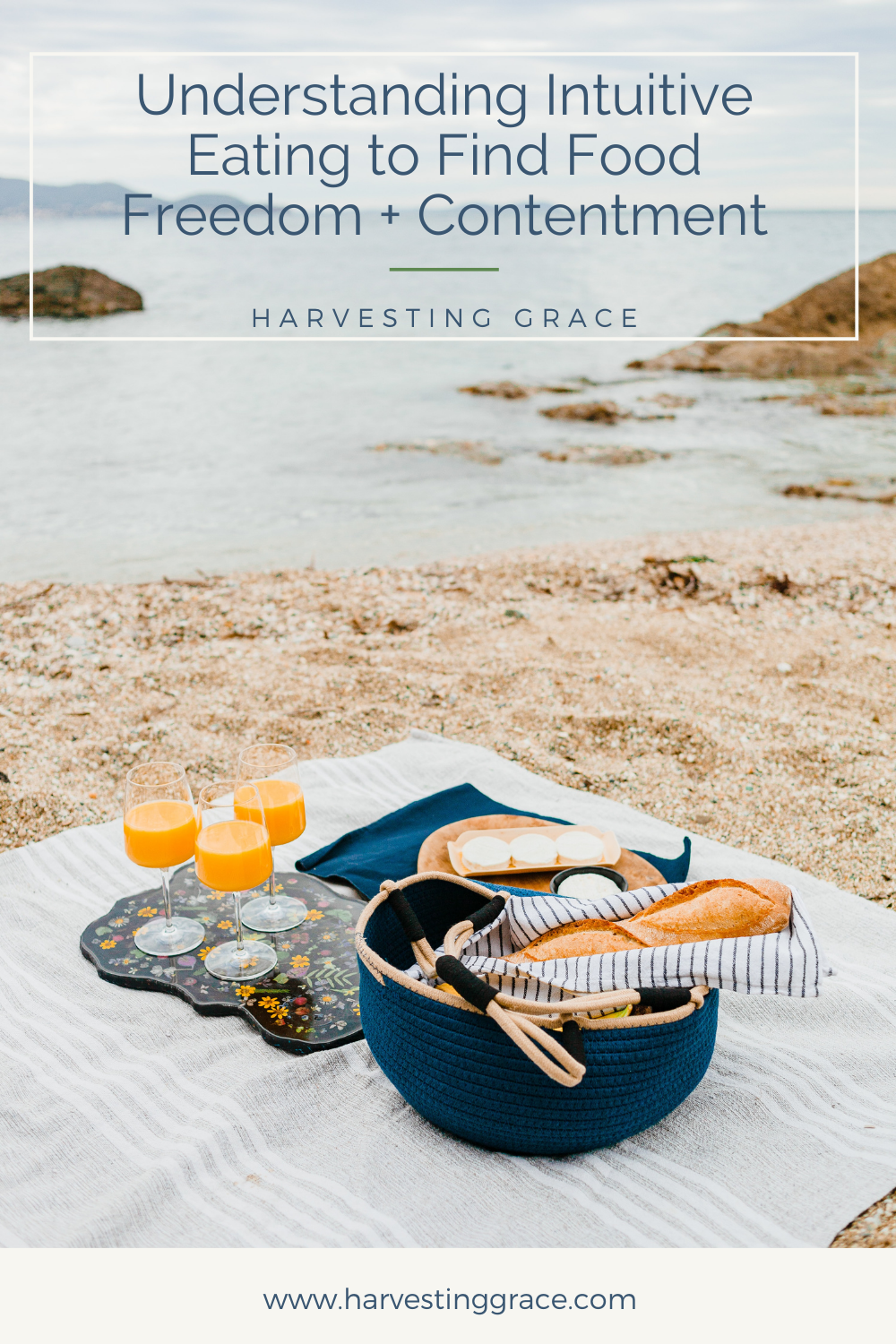Understanding Intuitive Eating to Find Food Freedom + Contentment
When you tune into your body and consume foods that are supportive of your bio-individual needs, you are practicing intuitive eating.
Intuitive eating is “trusting your inner body’s wisdom to make choices around food that feel good in your body, without judgment and influence from diet culture.” (Flores, 2019). On a deeper level, intuitive eating is tapping into your body’s innate wisdom. Every single one of us has innate wisdom. How cool is that? Essentially, innate wisdom leads you towards foods and nutrients that your body desires so it can thrive.
“Innate wisdom often operates at a subconscious level, naturally guiding us toward optimal health and vitality through instinctual choices instead of rational thought.”
The foods and nutrients that your body desires can be one thing at lunch and then another thing at dinner. It’s constantly changing. Not to mention, the foods your body desires will be different from mine – that’s bio-individuality. So how do you tap into your innate wisdom to practice intuitive eating? You rely on your senses – taste, smell, desire, and satisfaction.
Each of these senses plays a role in intuitive eating. When your body desires a particular food (which contains the nutrients your body needs), just the thought of that particular food sounds really good to you. Salivating about a food you're thinking of is another sign! The smell of a food your body is craving will smell really good to you. If it doesn’t, it isn’t what your body desires to have. The taste of a particular food should taste heavenly and you might found yourself thinking “this hits the spot”.
If I had a dollar for every time I’ve said that...and I digress.
Last, but not least, is satisfaction. Eating a food that your body desires + needs should leave you full and, yes, satisfied. You shouldn’t have cravings for anything else afterward or feel like you need to eat more.
Side note – having a treat after dinner doesn't always mean you're meal wasn't balanced and satisfying. It’s one thing if it’s an intense craving or happens consistently. This could be a sign your blood sugar is imbalanced and needs to be addressed. Adding healthy fats to every meal will help regulate blood sugar. Or it could mean you didn't consume enough protein or fat.
I don’t think there is any harm in enjoying a little treat after dinner if it’s low on the glycemic index (low sugar) and real food, such as a piece or two of dark chocolate, my homemade fudge, fruit with nut butter or cream, stuffed date, etc. I typically have a piece of dark chocolate every evening :) It's also a good source of magnesium, which almost everyone, especially women, are deficient in. Just putting that out there!
Signs of a Satisfying Meal
no cravings for sweets
satisfied (not stuffed)
balanced energy that lasts until your next meal (3-5 hours later)
mentally and emotionally sound
no digestive discomfort (bloating, gas, burping, cramps)
The thing about relying on your senses is that it only works when you're eating real food. The sad part of all of this is our senses have been dulled and manipulated with processed foods. Most processed foods are hyper-palatable. Hyper-palatable foods bypass your brain’s normal hunger cues, which lead to overconsumption of nutrient-lacking foods as you desire more and more.
Processed foods are addictive and they interfere with your innate wisdom as they become the prominent foods you crave. A few reasons why this is the case is because processed foods have chemicals, being man-made, that cause you to crave more of those foods, they may seem more appealing than whole foods, and maybe more convenient to purchase than whole foods.
This is a sad reality that needs to change.
Processed foods can lead to over-eating and disordered eating because of their hyper-palatability. This is where intuitive eating can be very helpful. Research has shown that intuitive eating can help with weight management and a positive relationship with food because you’re giving your body what it needs by listening to what it desires. Studies have also shown here and here that intuitive eating can improve body image + acceptance and emotional health, especially for women, and support the recovery process of emotional and disordered eating.
Intuitive eating isn’t a diet. It also isn’t a free pass to eat junk and processed foods. It’s based on eating real food. In essence, it embraces the ability to break away from diet culture and what you think you “should” eat. Practicing intuitive eating gives you the freedom to consume foods that sound good and taste good and leave you satisfied, without guilt or shame.
Here’s the caveat – there will be times when your body desires the slice of bread over the fresh greens or pancakes over the eggs. Lean into that. It won’t always be the case when you’re eating whole foods since they are nutrient-dense, but when it does happen, allow yourself the freedom to choose and enjoy without guilt.
Your body wants the crackers over the carrots? Choose the crackers.
You rather have a piece of chocolate over apple slices? Have the chocolate.
You’re feeling the slice of bread instead of the bed of greens? Eat the bread.
Satisfying what your body is craving is satisfying the nutrient depletions in your body. The difference between intuitive eating and splurging or binge eating is that you’re making a conscious choice to choose one food over another by listening to your body. Because you were intentional with your choice, you'll find more pleasure in the food as you slow down, relishing every bite.
The more you eat nutrient-dense foods, the fewer moments you’ll find your body craving something that isn’t supportive or healing to the body. That is why intuitive eating isn’t a free pass to eat junk. Pretty cool, eh?
Eat for your body, not for someone else’s. Choose nutrient-dense, whole foods that are supportive of your body and make them the main foods you consume. And when you desire something that isn’t deemed “healthy”, really enjoy it without shaming yourself. Give yourself permission to just enjoy. With this approach, you’ll find yourself leaning back into nutrient-dense foods as you fuel your body with supportive nutrients and find satisfaction.
This is how intuitive eating provides food freedom + contentment. Practicing intuitive eating + mindful eating means stepping away from diet culture and restrictive eating and stepping into what your body desires by tuning into your body’s innate wisdom and meeting it where it's at.
It’s a practice that will take time to cultivate, but you’ll learn more and more about yourself along the way as you let go of food rules, restrictions, and food-related punishments.
And please take note – intuitive eating, like everything, isn’t for everyone. But, it’s worth trying, especially if you struggle with having a positive relationship with food or your incredible body. There isn’t a rigid format or strict rules to follow. This practice serves as a guide. So, take these tips and apply them to your intuitive eating practice, modifying them to fit your needs.
Support your body. Love your body. Listen to your body.
It has a lot to say.
Sources
Bruce LJ, Ricciardelli LA. A systematic review of the psychosocial correlates of intuitive eating among adult women. Appetite. 2016 Jan 1;96:454-472. doi: 10.1016/j.appet.2015.10.012. Epub 2015 Oct 22. PMID: 26474781.
Flores, A. (2019). What Does Intuitive Eating Mean? National Eating Disorders Association. Retrieved from https://www.nationaleatingdisorders.org/blog/what-does-intuitive-eating-mean
Koller KA, Thompson KA, Miller AJ, Walsh EC, Bardone-Cone AM. Body appreciation and intuitive eating in eating disorder recovery. Int J Eat Disord. 2020 Aug;53(8):1261-1269. doi: 10.1002/eat.23238. Epub 2020 Feb 5. PMID: 32020677.
Linardon J, Mitchell S. Rigid dietary control, flexible dietary control, and intuitive eating: Evidence for their differential relationship to disordered eating and body image concerns. Eat Behav. 2017 Aug;26:16-22. doi: 10.1016/j.eatbeh.2017.01.008. Epub 2017 Jan 23. PMID: 28131005.
Nutritional Therapy Association. (2019). Evolution of the Modern Diet. Nutritional Therapy Association. Student Guide, 2-6.
One Man’s Meat, Another Man’s Poison: hWp://www.doctor-natasha.com/One-mans-meat-another-mans-poison.php
Van Dyke N, Drinkwater EJ. Relationships between intuitive eating and health indicators: literature review. Public Health Nutr. 2014 Aug;17(8):1757-66. doi: 10.1017/S1368980013002139. Epub 2013 Aug 21. PMID: 23962472.



